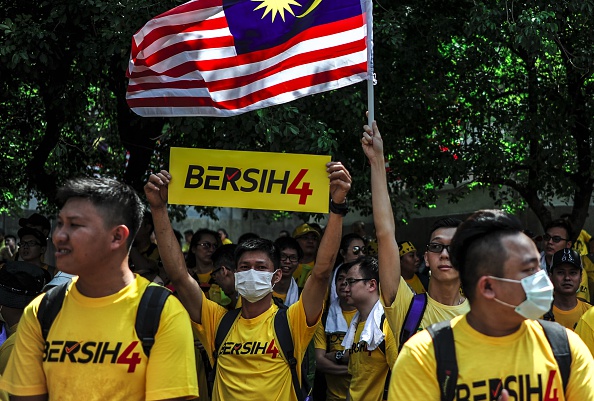
Thousands of protesters are expected to take to the streets of Kuala Lumpur and other Malaysian cities on Saturday to call for the resignation of Prime Minister Najib Razak.
Popular discontent with Najib’s leadership has rapidly escalated since early last month, when an exposé in The Wall Street Journal revealed that his private bank accounts held over $700 million in funds purportedly siphoned off a struggling state investment fund called 1Malaysia Development Berhad.
Najib has firmly denied malfeasance and penalized those who have alleged it. He has threatened to sue the Journal for libel; more controversially, he sacked his deputy prime minister, Muhyiddin Yassin, in a cabinet reshuffle in late July after Muhyiddin called for transparency in the matter.
Today’s planned rally, which the authorities have deemed unlawful, is the latest exercise in political discontent within this once-promising Southeast Asian state. The engine of this discontent is an unofficial pro-democracy, anti-corruption coalition called Bersih, which in Malay simply means “clean.” Though the recent allegations of corruption have galvanized the demands for Najib’s removal from power, many Malaysians see the scandal simply as one visceral incident within an endemically broken system.
“He’s dropped the economy,” a taxi driver in Kuala Lumpur tells TIME. “Everyone is very scared.”
“It’s very simple: the Malaysian people are suffering right now,” Ravin Kabhi, a Malaysian man who recently moved to Australia, said. “Look at our currency at the moment — it’s 4.2 to the dollar. I’m a recent graduate, and there are no jobs, because multinational corporations don’t want to spend money in periods of instability.”
Malaysia has long sought to fashion its global image as a crucible of progressive politics and economic stability in Southeast Asia, and for many years, the portrait was compelling. Regular elections offered a facsimile of democracy. The construction of the Petronas Towers in 1998 — the tallest skyscrapers in the world until Taipei 101 opened in Taiwan six years later — provided an internationally recognizable emblem of the country’s capitalist triumph during the last two decades of the twentieth century.
The controversies that have surrounded Najib’s leadership since his narrow election in 2009 have exposed the weaknesses in this narrative. Najib leads the United Malays National Organization (UMNO), the right-wing Malay nationalist party that heads the incumbent National Front coalition and derives most of its support from ethnic Malays who benefit from its policies. In September 2013, Najib’s government fortified longstanding laws that reserve education benefits, government jobs, and entrepreneurship opportunities for the ethnic Malay population.
“I support their right to do this, to protest,” ethnic Malay student Ziela Rahim said, gesturing to the yellow-shirted protesters who loitered beneath the metro tracks above Jalan Tun Perak. “But [Najib] is my prime minister, and so I think he has the right to do what he feels is right for us.”
But those same pro-Malay policies, political and economic experts contend, have encouraged hostility and also weakened the economy, because they have encouraged Malaysia’s marginalized Chinese and Indian populations to seek better opportunities elsewhere.
Najib has also become increasingly strident in his dismissal of the growing opposition, even as ethnic Malays — the bulwark to his political legitimacy — join its ranks. On Saturday morning, the state held a full dress rehearsal for the country’s independence day celebration on August 31. The practice, held in the same public square where the anti-Najib protesters are to gather later in the day, was one of pomp and circumstance: military marching bands played the national anthem, which was amplified over loudspeakers; organized civilians in red t-shirts marched in lockstep, holding small Malaysian flags; military jets roared overhead.
Outside of Merdeka Square, some members of the opposition, dressed in Bersih’s yellow shirts, had started to gather in anticipation.
“Whether or not [today] has an effect on the political process isn’t important. It’s my duty — our duty — to align with the cause,” Lui Tuck, a 45-year-old factory manager from Kuala Lumpur, said. “The current government is disgusting. You want to tell lies, tell proper lies. If you want to take our money, take our money, but at least tell convincing lies that let us sleep at night.”
More Must-Reads from TIME
- Donald Trump Is TIME's 2024 Person of the Year
- Why We Chose Trump as Person of the Year
- Is Intermittent Fasting Good or Bad for You?
- The 100 Must-Read Books of 2024
- The 20 Best Christmas TV Episodes
- Column: If Optimism Feels Ridiculous Now, Try Hope
- The Future of Climate Action Is Trade Policy
- Merle Bombardieri Is Helping People Make the Baby Decision
Contact us at letters@time.com